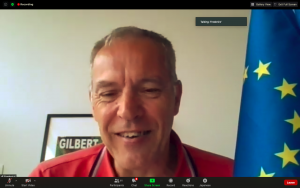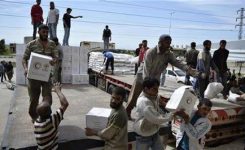Notizie
WEBINAR Aiccre 3 giugno, Vallier: essenziale ruolo servizio pubblico

I Paesi dove i governi non sono autoritari sono stati oggettivamente più efficienti nel gestire la crisi della pandemia. Paesi nei quali i poteri locali hanno avuto delle responsabilità e quindi hanno potuto gestire la situazione in modo più agevole rispetto a paesi dove c’è meno decentralizzazione.
Se guardo a ciò che è accaduto in Europa, per esempio in Francia, che è un paese ancora ahimè molto centralizzato, che ha dimostrato le sue debolezze con un potere centrale che ha voluto in un primo momento accentrare le risposte per poi rendersi velocemente (e ancora di più adesso dove la crisi è in phasing out) che niente si sarebbe potuto fare senza l’appoggio degli enti locali e regionali. Abbiamo visto come anche il ruolo del servizio pubblico regionale locale è essenziale (abbiamo parlato degli infermieri, dei medici), ma cosa sarebbe avvenuto se il servizio pubblico locale si fosse fermato? Quelli che hanno mantenuto la società in piedi, direi, durante questa pandemia, è stato proprio il servizio pubblico. Questo è il ruolo essenziale del potere locale e regionale, dobbiamo ripensare il modello di governance, almeno la relazione tra i livelli locali, regionali e nazionali ed europei.
Il CCRE/CEMR è in piena discussione con la Commissione europea per vedere come possiamo accompagnare le città, le municipalità nel loro sviluppo, nelle risposte alla crisi economica che arriverà (anzi che c’è già purtroppo) e questo al di là della crisi sanitaria. Quindi come potremo implementare un modello di sviluppo che rispetti le priorità che la Commissione aveva dato sei mesi fa e quindi siamo molto lieti di vedere le risposte della Commissione della settimana scorsa per quanto riguarda il sostegno allo sviluppo, pur mantenendo la priorità che il patto verde – cosiddetto Green Deal – e allo stesso tempo assicurarci che i miliardi di euro che saranno stanziati o comunque messi a disposizione per questo rilancio, possano raggiungere i territori e possano anche essere discussi e attuati tramite questi piani di rilancio elaborati dagli Stati e dai territori, dalle Regioni, collettività e così via.
Quindi è proprio questo il nostro ruolo, dobbiamo lavorare con tutti gli associati nazionali, con l’AICCRE in Italia, per discutere proprio con i governi e il CCRE/CEMR con la Presidenza tedesca, per assicurarci che i bisogni dei territori siano presi in considerazione in questo piano di rilancio e, poi al livello internazionale, Non siamo più in un mondo dove si può fare da soli e senza prendere in considerazione il piano internazionale e l’azione locale ed è molto curioso vedere che ad ogni crisi, peraltro, c’è bisogno di un coordinamento internazionale – e lo si vede in una crisi come questa – dobbiamo sostenere l’Organizzazione Mondiale della Sanità perché è tramite la relazione tra gli Stati che potremo costruire una politica efficiente e dobbiamo localizzare le risposte.
C’è questo bisogno di avere una risposta globale ed un’azione locale ed è ciò che si diceva nel 1992 al Summit di Rio perché è indispensabile perché è solo dalle risposte locali che devono essere costruite solo nell’apprendimento e nello scambio di esperienze. Lo si vede in Europa e a livello internazionale: abbiamo bisogno di nutrire queste esperienze comuni e anche gli enti locali hanno bisogno di capire come funziona altrove. Lo possiamo constatare anche con la fine del confinamento che ci sono richieste di alcune città per vedere come funziona altrove, in Austria per esempio, oppure in Svezia dove non c’è stato il confinamento.
Per il futuro dovremmo anche considerare come possiamo costruire degli scambi tra le città europee, i partner dei paesi del sud e questo del mondo intero proprio per accompagnare lo sviluppo sostenibile e il far parte di questa logica che abbiamo accettato al livello globale, che abbiamo tutti apprezzato, prendendo in considerazione le realtà odierne e ovviamente le realtà della crisi legate al Covid-19, però spostandole e andando oltre.
Countries where governments are not authoritarian have been objectively more efficient in managing the pandemic crisis. Countries where local authorities have had responsibilities and have therefore been able to manage the situation more easily than countries where there is less decentralisation.
If I look at what happened in Europe, for example in France, which is still, alas, a very centralised country, which demonstrated its weaknesses with a central power that wanted to centralise the responses at first and then quickly (and even more so now where the crisis is phasing out) that nothing could have been done without the support of local and regional authorities. We have seen how the role of the local regional public service is also essential (we talked about nurses, doctors), but what would have happened if the local public service had stopped? Those who kept society on its feet, I would say, during this pandemic, were the public service. This is the essential role of local and regional power, we must rethink the model of governance, at least the relationship between the local, regional and national and European levels.
The CEMR/CEMR is in full discussion with the European Commission to see how we can accompany cities and municipalities in their development, in their responses to the economic crisis that is coming (or rather, that is already there, unfortunately) and this beyond the health crisis. So how will we be able to implement a development model that respects the priorities that the Commission gave six months ago and therefore we are very pleased to see the Commission’s responses last week with regard to support for development, while maintaining the priority that the Green Pact – the so-called Green Deal – and at the same time ensuring that the billions of euros that will be allocated or in any case made available for this relaunch can reach the territories and can also be discussed and implemented through these relaunch plans drawn up by the states and territories, regions, communities and so on.
So this is precisely our role, we must work with all the national members, with AICCRE in Italy, to discuss precisely with the governments and the CCRE/CEMR with the German Presidency, to ensure that the needs of the territories are taken into account in this recovery plan and then at international level, We are no longer in a world where we can do things alone and without taking into account the international plan and local action, and it is very curious to see that in every crisis, moreover, there is a need for international coordination – and we see this in a crisis like this one – we must support the World Health Organization because it is through the relationship between States that we can build an efficient policy and we must locate the answers.
There is this need to have a global response and local action and this is what was said in 1992 at the Rio Summit because it is indispensable because it is only by local responses that we must build only in learning and exchanging experiences. We see this in Europe and internationally: we need to nurture these common experiences and local authorities also need to understand how it works elsewhere. We can also see this with the end of confinement that there are requests from some cities to see how it works elsewhere, in Austria for example, or in Sweden where there has been no confinement.
For the future, we should also consider how we can build exchanges between European cities, our partners in the south and the rest of the world to accompany sustainable development and to be part of this logic that we have accepted at a global level, which we have all appreciated, taking into account the realities of today and, of course, the realities of the crisis linked to Covid-19, but by moving them and moving on.








